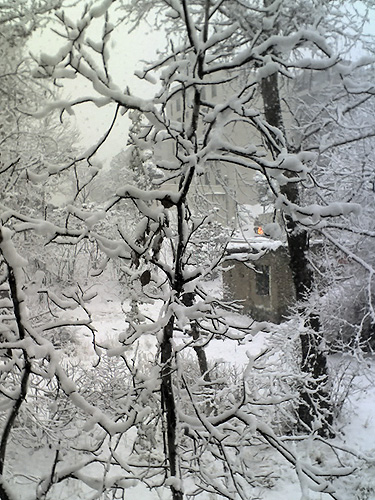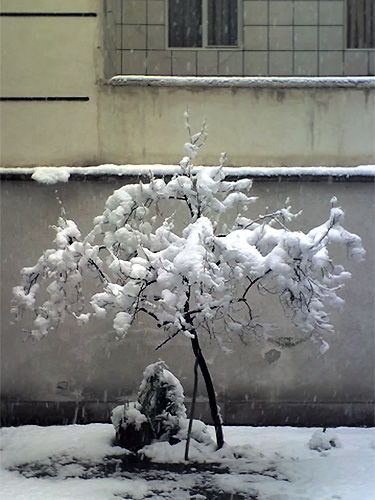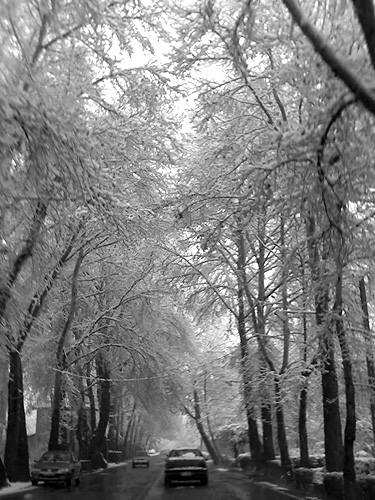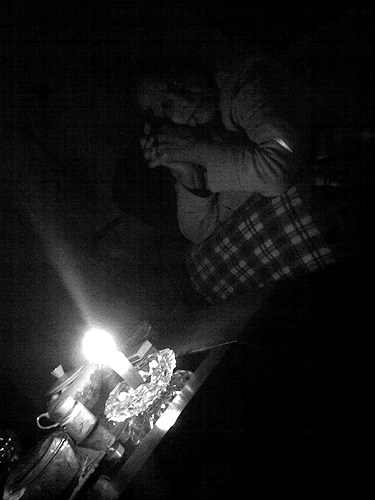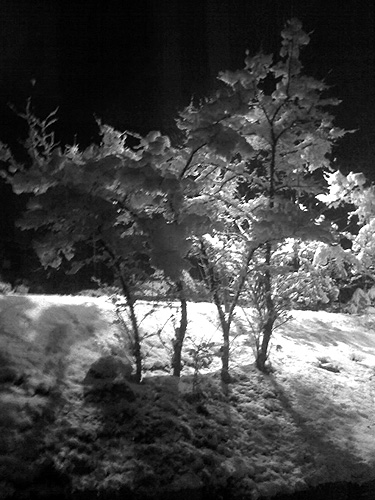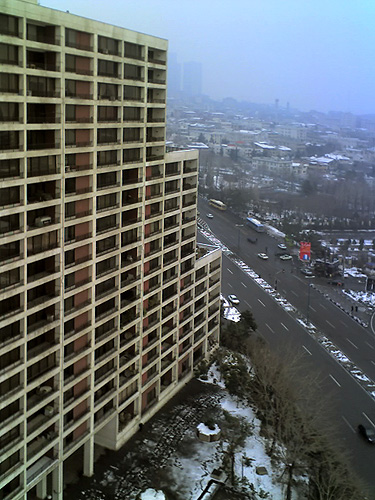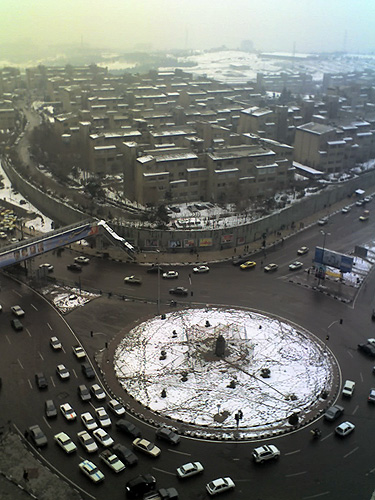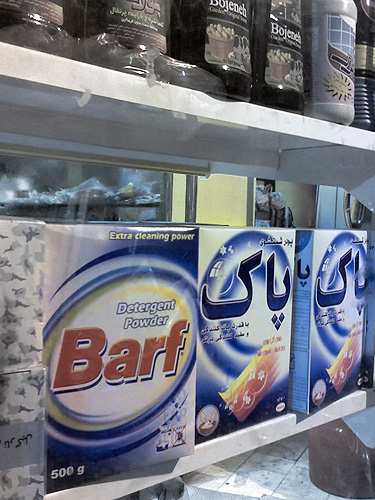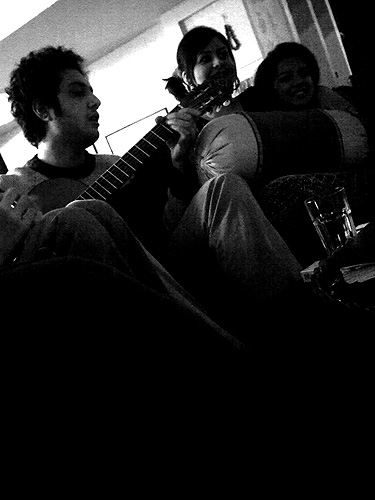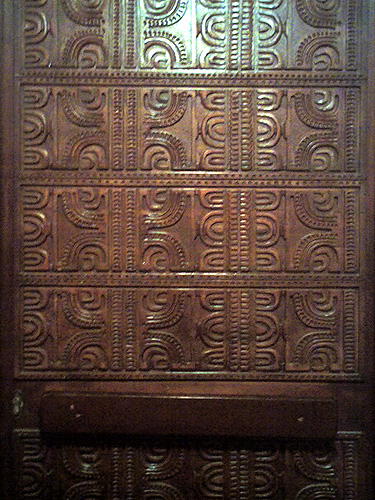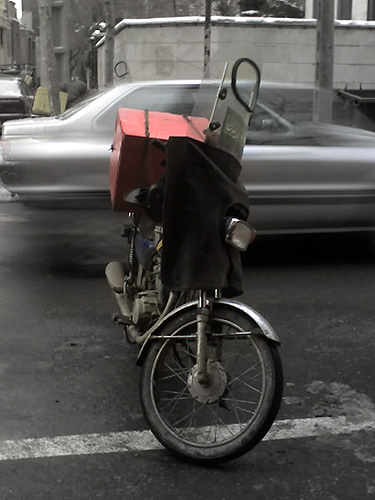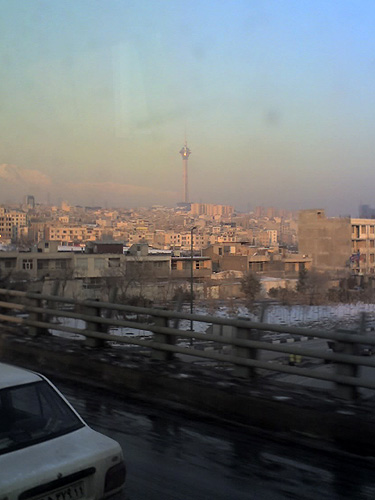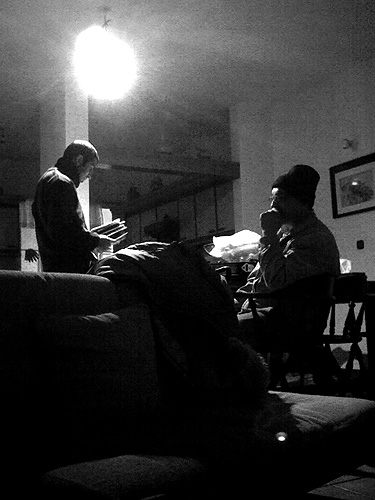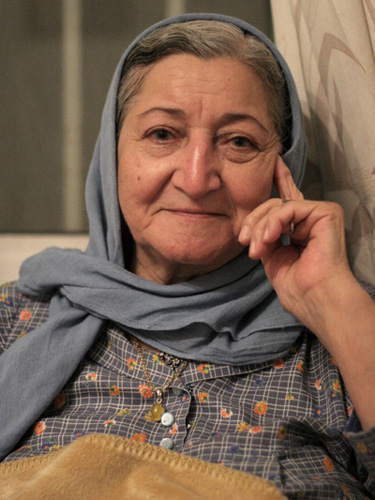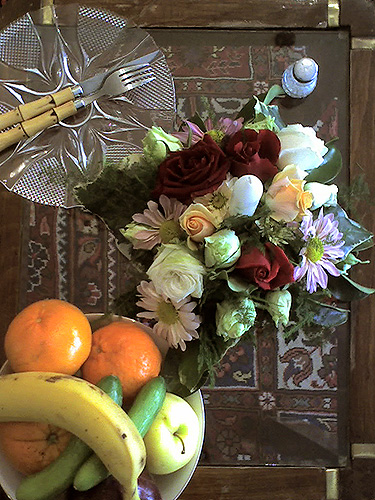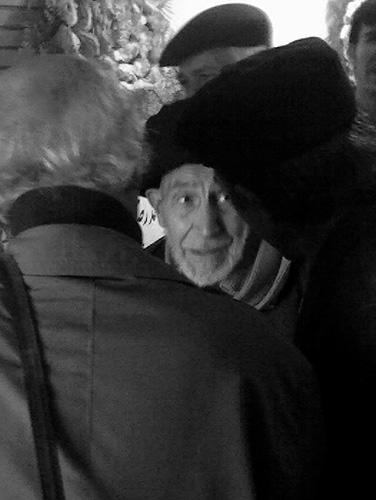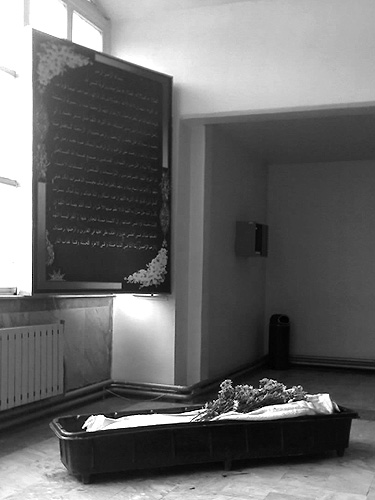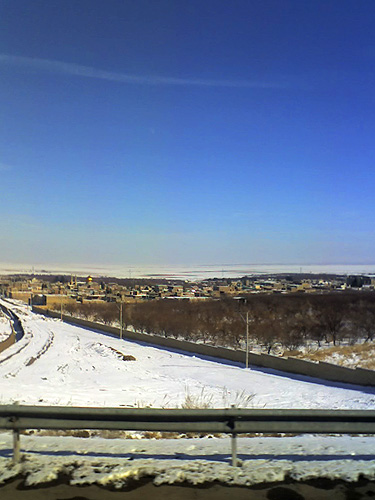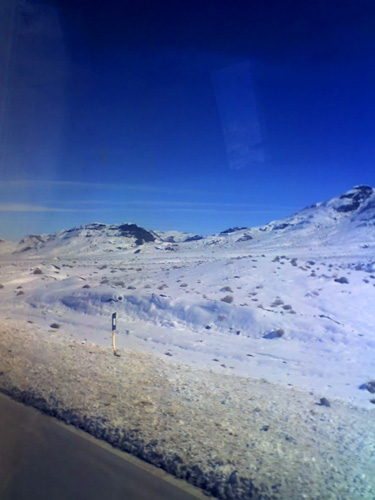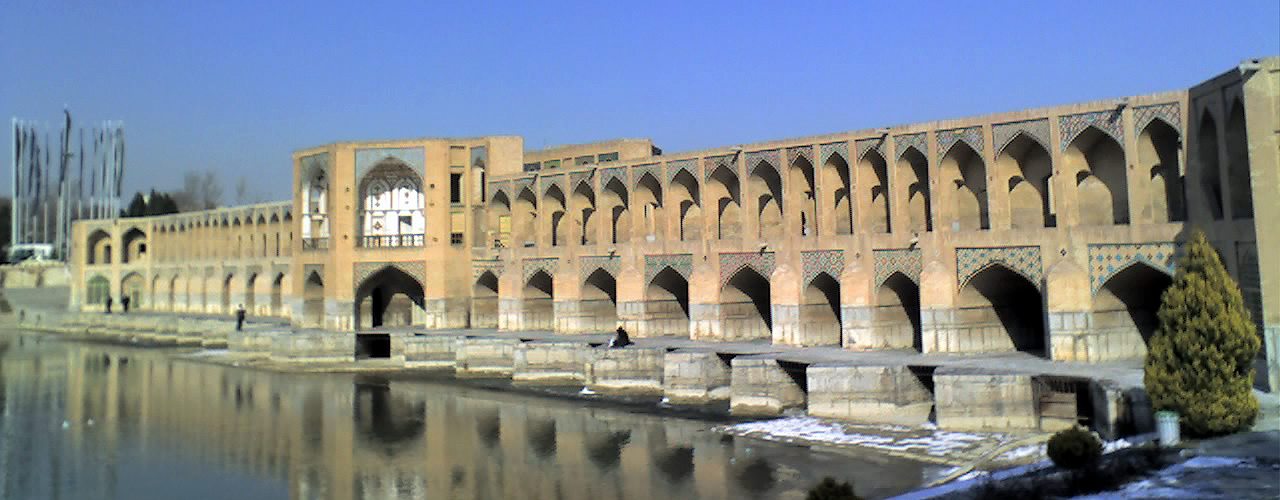The first major snow of the season arrived on January 2nd. I really love the beauty it brings. I missed not ever having it in LA. One benefit of snow is that it covers all the ugliness and paints a pretty picture, so that for example I can share these two otherwise garbage filled views from our kitchen window. |
The tree in our backyard covered in snow. Having the seasons change is like having mother nature remind you visually that the clock is ticking. Roll over for a photo of the same tree in the October issue. |
Driving in Tehran in winter feels like driving through a beautifully shot black and white film. I guess same can be said about any city in winter. But there are more blacks in Tehran. The color black that is. |
I hung out with my grandma when the power in her neighborhood went out for a couple of hours one night. She made sure to thank Edison in her prayers when the power came back on. People don't believe me when I tell them we have power outages in LA too. |
Speaking of snow, you can't buy ice in stores here. You may be able to find huge ice blocks, but you can't really trust the water they use in them. Plus, they're not very practical for purposes of cooling your Cola [and stuff]. So ice cubes from your freezer will have to do. |
An old Iranian proverb says "the bigger your roof, the more snow you'll have," meaning the richer you are the more problems you have to deal with. But I always wondered, wouldn't people with bigger roofs afford to hire folks with smaller roofs to plow their snow so that they don't have to deal with it themselves?! |
"Be careful not to catch cold" is officially a term of endearment in Iran. People treat the common cold as though it's the most deadliest disease. Even strangers warn you of it! And once you do catch cold, everyone gasps and says "oh no! How did it happen?!" Then comes the long list of things you should eat or not eat in order to fight it! |
Khayam Building in Shahrak-e-Gharb. |
The view from Khayam Building of the main Shahrak-e-Gharb square, though it's not really a square, more like a circle, or a droplet even. |
Barf detergent powder, not to be confused with puke-in-a-box. Barf means snow in Farsi. No one bothered to translate. Because of US sanctions, detergent powder is no longer produced in Iran because of an ingredient that can no longer be imported. I personally plan on taking my dirty undies to the White House to wash. |
A popular [satellite] TV station in Iran is Fashion TV -- A 24-hour channel dedicated to sexy models wearing sexy clothes -- or none at all. People just let it run in the background. You have to wonder what this does to an otherwise oppressed-by-theocracy society. Some of this stuff is banned in the US! |
A young man playing the guitar at a small gathering of friends and strangers. Roll over for the daf player and a singer. Female singers are banned from singing in public and or in films. They can only have concerts for an all female audience. I am convinced that never in the history of the world a regime has been as provocatively lame! |
A beautiful door imported from Mexico. When Mexico becomes an exotic country overseas, you know you're far away from LA. In fact, add that to the list of things you take for granted in Los Angeles; Mexico and Mexicans. Oh how I miss tacos, burritos and my Mexican friend papa Jim! |
The delivery boys and men will bring you burgers, fries, pizzas, kabobs, and Italian food no matter where you are. Ordering in is a popular option when you don't want to be bothered with going to the restaurants where they're forced to shove moral values down your throat. |
The old school "iPhone" as well as the new-school "iPhone" (roll over). |
This has turned out to be one of the coldest winters on record. Gas and electricity outages are more frequent than they should be considering the country's vast resources. Think Enron spread throughout the government. Corruption on a massive scale is leading to the suffering of ordinary people. |
It must be nice to have a creature in your home who is content about life regardless of what goes on beyond your walls. And nowhere is this more visible than in Iran. |
An abstract photo of something familiar. Guess what it is and you could win a spot in next month's anniversary issue! Yep, next month will mark the 12th edition of LGOIT, as well as my 29th birthday and my one year anniversary of moving to Iran. How time flies... Time to ask myself whether it was a wise decision to move or not... |
Having a filmi is like having a personal Netflix account. The only difference is that your filmi guy brings only bootleg DVDs of the latest films that may or may not play in your DVD player. That and the fact that you can buy each title for about $1.30 and or rent it for $0.90 a week. A new release that I highly recommend is Marjan Satrapi's Persepolis. |
At 84, my Aunt Esmat was like my maternal grandmother. But because she lived in my mother's city of Esfahan all her life, I didn't get the chance to grow as close to her as I am to my paternal grandma. But I was still very saddened by the news of her passing away on January 12th, which set off a week of mourning in Esfahan. |
I took a bus to Esfahan alongside my cousins (her grandchildren) soon after having heard the news. Esfahan is a good 6 hour bus ride from Tehran. There was an overall melancholy mood in and outside the bus. I even found the empty bottles of Pepsi at the rest stop to be sad. |
We found her soulless body in an eternal sleep still on her bed; glowing with a smile. This is her room as she left it. Full with photos of her extended family, her sewing machine, daily diaries of more than 60 years, and her meticulous collection of self-made quilts and handmade crafts among other things. |
Unlike the funeral arrangements in the US, in Iran there are multiple ceremonies; on the 3rd, 7th and 40th days of someone's passing away, followed by the last one on the one year anniversary. During these times friends and families come and pay their respects, as well as help each other cope with the death. |
People came from all over the city and Iran to pay their respects. I didn't know most of them. Turns out this gentleman is the oldest member of my extended family; first with a University degree (English and French), first to wear a tie, first to own a car. I sense that in Iran there's almost a hidden pleasure in the process of mourning and coping with death of a loved one. |
Even the most ultra-nationalist Iranians admit that Islam is very much engraved in the identity of Persians; no matter how hard they try to distance themselves from it. Nowhere is this more apparent than in traditions surrounding death and dying. My aunt's secular family gathered to pray for her before her burial -- she herself was a practicing muslim. |
Bodies are not buried with a coffin, they're wrapped in cloth and buried straight in the ground. This is my aunt Esmat's final resting place (with a temporary tombstone).
May she rest in peace...
|
On my bus ride back to Tehran I had some time to gather my thoughts and reflect. At times like these you may find yourself surrounded by an ocean of unconditional love of an extended family who does not really know you. But I found that I am just as grateful, if not more grateful, for the conditional love you earn from friends who know you. |
I came to conclude that you may live free in the US, but you die alone. At least by Iranian standards. You have a better life in the US, but you die a sweeter death in Iran. You take that for what it's worth.
|
For one's self, life is certain. Afterlife is not. If the choice for immigrants like me is between a better life in the US and a sweeter death/afterlife in Iran, I choose life. It's harder to lose a loved one in the US, not that you become any less human, but there are more ways to help you cope in Iran. That perhaps is the biggest price you pay for your freedom. |
The Khaju bridge in Esfahan, a city where many a great kings, noblemen, poets, artists and craftsmen have come and gone over the past few millenniums. The city has now lost a citizen guest of over 84 years with the passing of my aunt Esmat. But life goes on in Esfahan...
Previous Issue | Next Issue | Home
|
|
|
